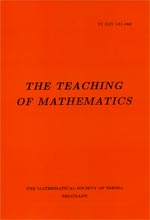
| Interchanging two limits |
| Zoran Kadelburg and Milosav M. Marjanović |
Abstract By the use of convenient metrics, the ordered set of natural numbers plus an ideal element and the partially ordered set of all partitions of an interval plus an ideal element are converted into metric spaces. Thus, the three different types of limit, arising in classical analysis, are reduced to the same model of the limit of a function at a point. Then, the theorem on interchange of iterated limits, valid under the condition that one of the iterated limits exists and the other one exists uniformly, is used to derive a long sequence of statements of that type that are commonly present in the courses of classical analysis. All apparently varied conditions accompanying such statements are, then, unmasked and reduced to one and the same: one iterated limit exists and the other one exists uniformly. |
Keywords: Interchange of two limits, uniform convergence, definite integral as a limit. |
Pages: 15$-$29 |
Volume VIII , Issue 1 , 2005 |
